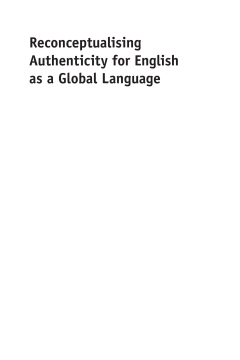
Additional Information
Book Details
Abstract
This book examines the concept of authentic English in today’s world, where cultures are in constant interaction and the English language works as a binding agent for many cross-cultural exchanges. It offers a comprehensive review of decades of debate around authenticity in language teaching and learning and attempts to synthesise the complexities by presenting them as a continuum. This continuum builds on the work of eminent scholars and combines them within a flexible framework that celebrates the process of interaction whilst acknowledging the complexity and individual subjectivity of authenticity. Authenticity is approached as a complex dynamic construct that can only be understood by examining it from social, individual and contextual dimensions, in relation to actual people. Authenticity is a problem not just for language acquisition but one which affects us as individuals belonging to society.
This wide-ranging book offers a timely reassessment and reassertion of the notion of authenticity in English language education, decisively unshackling it from its ‘classic’ mooring in native-speaker models. Richard Pinner convincingly argues that authenticity – viewed as relevant to the socially dynamic contexts within which people are learning and using English today – is a more important goal for educators than ever before.
What has plagued the notion of authenticity to date has been an ‘alphabet soup’ of abstract terms and simplistic references that attempt to define what it is and why it is important in L2 teaching and learning. In a compelling personal voice, Pinner masterfully unpacks the complexities of authenticity while re-positioning it on a continuum that is inclusive of global Englishes and relative to individuals’ selves and perceived position in rapidly changing societies.
Richard S. Pinner is Assistant Professor in the English Literature Department at Sophia University, Tokyo, Japan and has taught in the field of ELT for over 10 years. His research interests include classroom practices and learner motivation, as well as authenticity and autonomy. He has published work in the ELT Journal, English Today, Applied Linguistics Review and Language Teaching Research.
This is a clever and horizon-expanding book with a lot to offer readers. It gives an insightful and comprehensive review of debates around authenticity in language teaching and learning while suggesting a new way forward that is less Anglocentric and less static. The book is written in a lively, engaging and in many places entertaining, way with ample examples to concretise at times complex lines of argument.
Anna Kristina Hultgren, The Open University, UK
Table of Contents
| Section Title | Page | Action | Price |
|---|---|---|---|
| Contents | v | ||
| Acknowledgements | vii | ||
| 1 Introduction to the Book | 1 | ||
| 2 Existential, Philosophical and Theoretical Underpinnings | 10 | ||
| 3 English as a Global Language | 34 | ||
| 4 Authenticity in Language Teaching | 63 | ||
| 5 The Authenticity Continuum | 99 | ||
| 6 Authenticity in Bilingual Educational Contexts | 131 | ||
| 7 New Media as a Catalyst for Authenticity | 144 | ||
| 8 Conclusion | 165 | ||
| References | 170 | ||
| Author Index | 188 | ||
| Subject Index | 191 |
